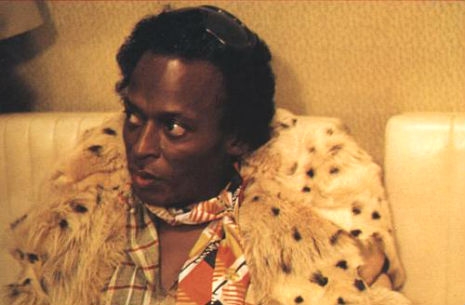
[I’ve got the flu today, so I’m retooling an older post from 2010 with a different video while I go feel sorry for myself!]
In 2010, The Quietus blog ran a feature where they asked musical luminaries like Nick Cave, John Lydon, Iggy Pop, Mike Patton, Wayne Coyne and Ennio Morricone what their favorite Miles Davis album is. Unsurprisingly, asking these iconoclastic fellas, the majority of the nods go to Miles’ incredibly far out 70s album (from Bitches Brew to Dark Magus basically), the ones that most jazz fans, and even staunch Miles Davis fans used to absolutely hate, but that have been reconsidered critically in recent years as the public caught up to them
For me, I started to get into this “difficult” spot of the Miles Davis catalog about ten-twelve years ago. I already owned Bitches Brew and Get Up With It (which features a incredible sidelong elegy to Duke Ellington titled “He Loved Him Madly” improvised in the studio after Miles heard Ellington had died. The piece was cited by Brian Eno as the beginnings of ambient music) but it was A) getting a really good stereo system in 2002 and B) reading this amazing rant by Julian Cope about this period of Miles’ output that saw me really investigate the “horrible” racket Miles was making then. Wanting new music to listen to on my new toy, I bought Dark Magus first, Pangaea and Agharta in the space of three consecutive days. Once I started, I fell into a musical rabbit hole that I didn’t get out of for about a year or two later. I was not a very popular guy with the neighbors back then, I don’t think.
Not that I am saying anything here that hasn’t been expressed already in quarters like The Wire magazine, but if you ask me, the material that Miles Davis produced between 1970 and 1975 (when ill health and drug dependency forced him to retire for several years) is the absolute apex of his vast recorded output. Don’t get me wrong, I love Kind of Blue, In a Silent Way, Sketches of Spain, and many other earlier Miles Davis albums, but the ones I play loudest, most often and that I pay the most attention to, are the coke-out live albums, Dark Magus, Agharta, Pangaea. These albums are… fucking unique and that’s putting it mildly. There is nothing else to compare them to, even remotely, in the history of modern music (Maybe Can meets Fela Kuti?)
With up to three electric guitarists (Reggie Lucas, Pete Cosey and Dominique Gaumont), Miles on organ and electrified trumpet (run through a wah-wah pedal) and a rhythm section consisting of the insane, propulsive drumming of Al Foster, Mtume on percussion and the most amazing Michael Henderson on bass holding the whole thing together, holy shit, these performances are AGGRESSIVE. Julian Cope wrote about notion of continental plates shifting to get across the power of the Pangaea set (recorded live in Osaka, Japan in 1975 on the evening of the day that Aghartha was recorded) and I’d say that’s about right. Every instrument which isn’t soloing is placed in service of THE GROOVE—even the guitars can be seen as adding a percussive element to the overall wall of noise-funk effect.
At the proper volume, it can plow you down like a Mack truck. Interestingly, from the midst of this dank, swirling sonic maelstrom, every time one of the musicians steps forward for a solo, it reminds me of the odd noises and “squiggly” sounds that seem to come out of nowhere in certain Stockhausen or Xenakis compositions, cutting through the soupy din (At one point on Dark Magus, a primitive drum machine is pulled out and used like a machine gun!).
This 1973 performance from the Montreux Jazz Festival is a pretty scorching example of what Miles and his band (Davis’ sidemen here are Dave Liebman, Reggie Lucas, Pete Cosey, Michael Henderson, Al Foster, Mtume) was doing live at the time. It MUST be turned up loud for the proper effect: